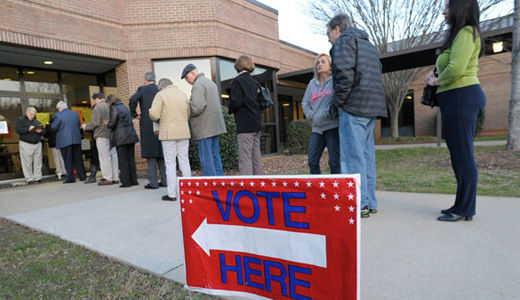
No doubt these midterm elections will be parsed and opined on for weeks and months to come. Democrats faced a bleak day-after with the Republican takeover of the Senate and resounding GOP victories on the state level in even traditional Democratic strongholds of Illinois, Maryland and Massachusetts. There are a few silver linings, but mainly it is a large stormy electoral cloud that hovers overhead. Contradictions and complexities abound but the far right has seized the political momentum, knocking labor and the people’s and progressive forces back on their heels.
Americans have been subjected to a constant media barrage – and not just from the usual far-right news sources – about Washington’s inability to get anything done and President Obama’s supposed weakness and ineffectiveness. As a result, voters this time blamed the Democrats even though the Republicans have been the obstructionists on Capitol Hill. A 24/7 drumbeat of media hype on a range of real problems from ISIS to ebola to Ukraine, Central American child refugees to Secret Service and Veteran Affairs scandals, contributed to a feeling of pessimism and cynicism, and distracted from the Republicans’ reactionary, anti-working-family agenda.
Fueled by big money and media influence, Republicans were able to effectively project an overarching anti-Obama narrative. The Republicans also got smarter. They moderated their message, sidelining tea party extremists. They fielded a more diverse field of candidates, including women, African American, Latino, gay and younger Republicans. With Koch brothers’ bucks they invested in their ground game and built a more sophisticated get-out-the-vote operation.
At the same time, Democrats failed to provide a coherent reason to vote for them, running away from the president’s record, which helped the GOP’s narrative. Although a couple of Democratic candidates ran smart campaigns, advocating for working families and their issues, most did not. Running for Senate reelection, Colorado’s Mark Udall seemed to exclusively focus on reproductive rights, specifically abortion and birth control, ignoring all other issues, as a way to woo women voters. Iowa’s Bruce Braley mocked the state’s Republican senator, Charles Grassley, as a “farmer who never went to law school,” while his opponent, Joni Ernst, a veteran and farmer who grew up with “one pair of shoes,” connected to voters. But where candidates offered a spirited campaign based on working family issues and values of economic fairness and democratic rights, as in Minnesota’s Senate and governor’s races or Michigan’s Senate race, they saw success.
Political pundits have spanned the sound bite spectrum. On one end some are comparing this election to the Seinfeld TV show – an election about “nothing” – claiming no single overarching theme or issue is galvanizing the electorate. On the other end some say it was a referendum on Obama and his policies. But a deeper look is needed. Here is a first glimpse:
-
It’s still the economy. Contrary to the Seinfeld metaphor, in exit polls 7 out of 10 voters said the economy is not so good or poor and 8 out of 10 worried about the direction of the economy in the next year. From the so-called red states – Alaska, South Dakota, Nebraska and Arkansas – to the so-called blue state of Illinois, voters overwhelmingly said yes to a hike in the minimum wage. But the minimum wage is just one piece of what’s needed to close the enormous wealth gap and end the lack of public investment in education, green jobs and infrastructure. Democrats largely didn’t articulate any popular economic vision, thus ceding it to Republican “pro growth” (pro-corporate, deregulating, union-busting, job-slashing) promises of job creation and lower taxes.
-
The Democratic strategy to distance themselves from the president also meant abandoning any claims to successes. Democrats did not seem to develop a strong defense of the Affordable Care Act even though its provisions have proven wildly popular and successful. Thus Sen. Mitch McConnell won re-election telling Kentuckians he would repeal Obamacare but they would be able to keep the popular state insurance exchange and Medicaid expansion that Obamacare made possible. Giving the GOP free reign in the narrative, and allowing it to be repeated in the media over and over again, seems self defeating. Moreover, much of the anti-Obama narrative is based on racist appeals and virulent anti-government ideology, and that largely went unchecked.
-
The Supreme Court’s Citizens United ruling was a game changer in favor of the billionaires and oligarchs, the energy and Wall Street elites. More than $4,000,000,000 – yes 4 billion dollars – was spent in this midterm cycle, mostly by right-wing backed groups. The negative ads on both sides, shown ad nauseum, fed a very cynical political outlook.
-
Tied to the Big Money and the advertising and ground operations it can buy is the attack on voter rights. Gerrymandering, voter ID laws, disenfranchising ex-felons, weak campaign finance laws, gutting the Voting Rights Act and GOP-run states’ stricter voter registration laws are just a few of the pillars that hold up a massive disenfranchisement structure. This must be challenged going forward.
-
People are complicated and so are their ideas about politics. On one hand, voters in Arkansas, South Dakota, Alaska, Nebraska and Illinois said overwhelmingly they want an increase in the minimum wage – an issue the Democrats took on as their own. Received wisdom said having such ballot measures helps the Democrats. Yet voters in those states chose Republicans in top of the ticket races for governor or Senate. Some Democrats did not even campaign on the issue. No wonder voters may see politics and politicians as removed from their daily lives, needs and values.
-
President Obama’s decision to put off executive action on immigration and deportation relief may have cost Democrats votes in states like Colorado while not helping the so-called Blue Dog Democrats running in Arkansas and other red states.
-
It’s an obvious argument but one that bears repeating: turnout matters. Democrats faced election battles in many states that Republican Mitt Romney won in 2012, and midterm elections are notorious for lower turnout among Democratic constituency groups. Combine this with voter suppression schemes and corporate cash supporting right-wing agendas, and no wonder people get discouraged from going to the polls. A major overhaul of the U.S. electoral system is badly needed. But the coalition needed to win elections cannot be based on urban and new voters only. For progressive victories, programs and campaigns that reach a multiracial constituency in rural, suburban and exurban areas are needed. That includes not writing off white and older voters as being too conservative.
What’s next? Labor, civil rights, environmental and other social and political movements will have to take stock and come up with new ways to build more united and bigger coalitions. The Keystone XL pipeline/curbing climate change/creating clean energy jobs, the Trans Pacific Partnership trade pact, immigration, militarism of foreign policy and the wars in Syria and Iraq may be some of the immediate challenges on the federal level. Closing the gaping canyons of class and racial inequality in wealth, education and life opportunities will drive much of the near-term battles, including the lead-up to the 2016 elections and next year’s municipal elections. Democratic rights from marriage equality to reforming police and law enforcement practices to providing a pathway to legalization for undocumented immigrants and guaranteeing women’s control over their own health decisions will also be ongoing contested areas.
Labor and others point to the overwhelming support for progressive policies. In one election night poll by Hart Research Associates 75 percent of the respondents said they want more spending on public schools, 73 percent favor hiking taxes on overseas corporate profits, 62 percent support increasing Social Security benefits, 62 percent want to raise taxes on the wealthy, and 62 percent back raising the federal minimum wage to $10.10. Again, people have nuanced and complicated ideas about all these issues, but such sentiments also show that despite the GOP victory, things can change in the next election.
President Obama at yesterday’s press conference refused to back down on his agenda: protecting Obamacare, access to a college education, reversing climate change, passing immigration reform and raising the minimum wage. Neither should we. Those issues and preventing an expansion of war in Syria and Iraq will lay the basis for the 2016 campaign. Winning these struggles can lay the basis for victories on more far reaching and radical demands necessary to improve people’s lives.
Photo: Voters line up to cast their ballots on Election Day. AP












Comments